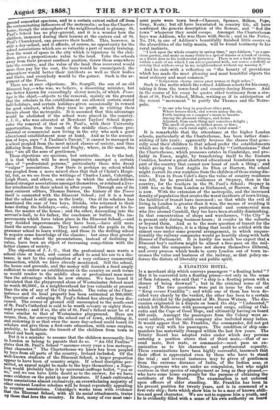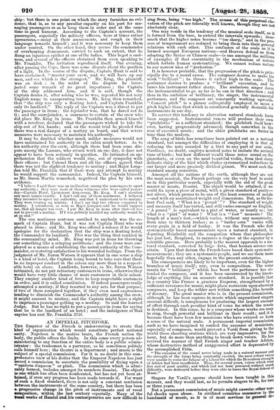A FLOATING HOTEL.
Is a merchant ship which conveys passengers "a floating hotel " ? May it be converted into a floating prison—not only in the sense
of Sam Johnson, who said that "a ship is a floating prison with a chance of being drowned " ; but in the criminal sense of the word ? The two questions were put in issue by the case of " Krog versus Franklin"; and while one of them has been de- cided very clearly by the verdict, the other has been to a certain extent decided by the judgment of Mr. Baron Watson. The dis- cussion originated in a dispute on board the ship "Undaunted" which left Melbourne with passengers and cargo, calling at Cal- cutta and the Cape of Good Hope, and ultimately having on board 400 souls. Amongst the passengers from the Colony were se- veral soldiers, and the cabin company also included many ladies. It would appear that Mr. Franklin, the commander, did not get on very well with his passengers. The condition of ship com- manders has materially changed within the last few years. The Trinity Board has adopted rules under which any persons entering a position above that of third mate,—that of se- cond mate, first mate, or commander—must pass an ex- amination as to his character and professional capacity. These examinations have been highly successful, insomuch that their effect is appreciated even by those who have to stand the trial ; and several instances may be given of gentlemen from the extreme distance of India, of the Indian seas, or China,—persons who are under no compulsion, but who might continue in that species of employment as long as they pleased,— who have come home expressly for the purpose of obtaining the certificate of the Board. The examination is not enforced upon officers of older standing. Mr. Franklin has been in his present position for twenty years and is in command of a first-rate ship ; facts which show him io be a man of known abili- ties andgood character. We are not suppose him a youth, and he is evidently filled with a sense of his own authority on board ship ; bat there is one point on which the story furnishes no evi- dence, that is, as to any peculiar capacity on his part for ma- naging passengers so as to keep them in order and at the same time in good humour. According to the Captain's account, the passengers, especially the military officers, were at times rather uproarious,—noisy at their amusements, and rough in their language towards himself ; and it was necessary to keep them under control. On the other hand, they accuse the commander of overbearing demeanour, carried to such an extent, that he flung an injurious epithet at one of the ladies. This begot a cool- ness, and several of the officers abstained from even speaking to Mr. Franklin. The irritation reproduced itself. One evening, after passing the Cape, there was some dispute about the position of a light. In the course of the dispute, Captain Hunt is said to have exclaimed, "muster your crew, and we will have up our men, and see which is the strongest." Mr. Krog, the plaintiff, was on deck ; in the midst of the dispute he inter- jected some remark of no great importance ; the Captain of the ship addressed him, and it is said, though the Captain denies it, after asking who he was, repeated. his not very English name in exasperating tones. Mr. Krog then remarked, that "the ship was only a floating hotel, and Captain Franklin only its landlord." The reply of the Captain was a threat to put the passenger in irons ; the rejoinder was, that he dared not do it; and the surrejoinder, a summons to certain of the crew who did place Mr. Krog in irons. Mr. Franklin then armed himself with a revolver, declared that the passengers wished to take the ship out of his hands ; and on the recent trial he pleaded that there was a real danger of a mutiny on board, and that severe measures were necessary to maintain his authority.
It may be doubted whether much milder measures would not have maintained his authority in the cabin much better. As to his authority over the crew, although there had been some dis- pute among the Lascars, who struck work on one day, it does not appear to have been seriously in question. He intimated an ap- prehension that the soldiers would rise, out of sympathy with their officers ; but Colonel Horn and all the officers agreed that there was not the slightest tendency to mutiny ; and Major Long- den told Mr. Franklin that if there were any attempt to mutiny he would support the commander. Indeed, the Captain himself, as Mr. Baron Martin remarked, negatived the plea by his own evidence.
"I believe I said there was an inclination among the passengers to upset my authority ; they were most of those witnesses who were called yester- day—Captain Hunt, Lieutenant Armstrong, Mr. Krog. I can't mention any more names exactly. I don't call any of them mutineers. I believed they intended to upset my authority, awl that I understand to be mutiny. They were verging on mutiny. I don't say that two officers conspired to mutiny. I considered, as soon as Major Longden said he would support me, that all danger was over. I put Mr. Krog in irons after that—it was not to prevent a mutiny. If I was publicly insulted my authority would be at an end."
The one mutinous sentence ascribed to anybody was the re- mark of Captain Hunt, but it was not Captain Hunt who was placed in irons; and Mr. Krog was offered a release if he would apologise for the declaration that the ship was a floating hotel, the Commander its landlord. This was the thing that rankled in the commanding mind. Mr. Krog was put in irons for throwing out something like a stinging antithesis ; and the irons were em- ployed as a means of establishing the moral authority of the Com- mander, or restoring satisfaction to his wounded feelings. From the judgment of Mr. Baron Watson it appears that in one sense a ship is a kind of hotel, the Captain being bound to take care that there be no improper conduct in the saloon any more than in a respect- able hotel on shore. Landlords, however, as Mr. Baron Watson intimated, do not init refractory customers in irons, otherwise they would have very little chance of more customers in. their saloon. They employ another kind of force to keep respectable customers in order, and it is called conciliation. If indeed passengers really attempted a mutiny, if they resorted to any acts for that purpose, if two of them conspired together, if they even used expressions tending to diminish the Commander's authority among the crew, it might amount to mutiny, and the Captain might have a right to imprison a passenger getting up a mutiny. So said the learned Judge. But he has no right-to put a passenger in irons for saying that he is the landlord of an hotel ; and the indulgence of that eaprice has cost Mr. Franklin 3751.



























 Previous page
Previous page